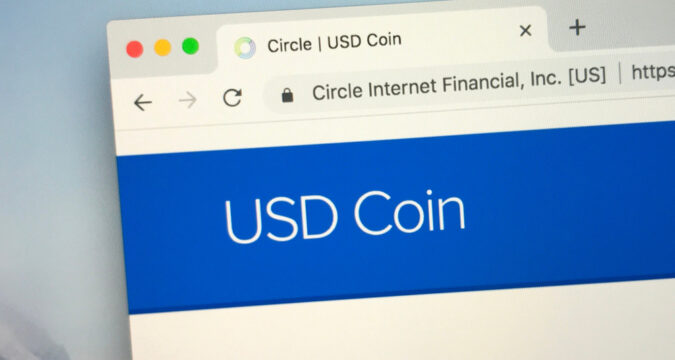
The decentralized blockchain-based currencies known as cryptocurrencies are a terrific investment opportunity, but they are also notorious for their volatility risk, as their value can change in just a few hours.
In such situations, a remedy is needed to maintain a coin’s value while giving consumers access to all the benefits of decentralized payment. Such situations are perfectly solved with stablecoins.
Stablecoins are substitutes for native cryptocurrencies that offer stable value and can be trusted to be used for online payments. USD Coin (USDC) is one type of stablecoin. We’ll go into the specifics of this stablecoin in the following paragraphs.
What is USD Coin (USDC)?
A joint venture between Circle Internet Financial and Coinbase led to the introduction of USD Coin (USDC) in September 2018. USD Coin (USDC) is a stablecoin developed as a virtual equivalent of the US dollar. It is an Ethereum-based ERC-20 token designed to function in a ratio of 1:1 with the US dollar.
Due to its linkage with fiat currency, USDC offers the advantages of blockchain services, like rapid and safe transactions, while also providing stability. Within the crypto environment, it is frequently utilized as an exchange vehicle, giving consumers access to a trustworthy and open-source digital currency choice.
The Working Mechanism of USDC
USDC follows the 1:1 ratio between USD and USD Coin (USDC). If someone wants to purchase USDC, they must deposit US dollars into the lender’s bank account, which converts the USD into USD using a smart contract. This process is known as tokenization.
An equivalent number of USDC tokens are created and issued to the user’s digital wallet. Similarly, if someone desires to exchange USDC for USD, they can do it via a redemption procedure. Under this process, the equivalent amount of USD is returned to the user, and the USDC tokens are burned.
Moreover, regular audits are carried out by unbiased accounting organizations to guarantee transparency and preserve the peg by ensuring that there is an equal quantity of USDC tokens in circulation and US dollars maintained in reserve.
Use Cases of USD Coin
Several use cases exist for USD Coin (USDC) in the cryptocurrency industry. Settlement, lending, investment, and trading opportunities are all created by USDC. It acts as a stable and volatility-resistant means of exchange for traders, enabling trading between various cryptocurrencies and exchanges. It provides a rapid and budget-friendly option for international transfers and remittances.
Furthermore, USDC is frequently used as a backup in decentralized finance (DeFi) for loans and yield farming. It is becoming more integrated with conventional financial services, allowing lending mediums, savings accounts, and other investment vehicles to be created.
Why is USDC So Popular?
USD Coin (USDC) has seen a substantial increase in popularity and is a well-known stablecoin in the market. Firstly, due to its stability and pegged value to USD, it is a desirable choice for traders looking for a trustworthy means of exchange resistant to price fluctuation. Good regulatory compliance has further gained users’ trust.
The acceptance of USDC has also been aided by its association with popular cryptocurrency trading platforms, wallets, and decentralized finance (DeFi) systems. The availability and usability of USDC have also expanded with the currency’s extension across numerous blockchain networks.
Risks Associated with USDC
Like every currency, USDC also brings some risks that users must know. USDC depends on a centralized organization to manage its reserves, increasing counterparty risk, which can directly impact the USDC value if the custodian runs into financial problems or cannot fulfill its responsibilities. US lawmakers are always changing the regulatory framework, which poses a regulatory risk to USDC.
The wider cryptocurrency ecosystem also presents systemic hazards, such as breaching incidents, smart contract shortcomings, and network congestion, which can affect the security of USDC transactions.
Lastly, since USDC’s stability is correlated with that of the US dollar, any variables affecting the worth of the US dollar may also affect USDC’s value.




